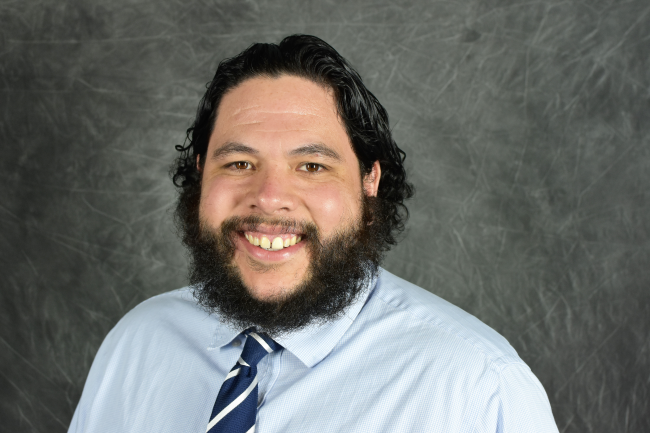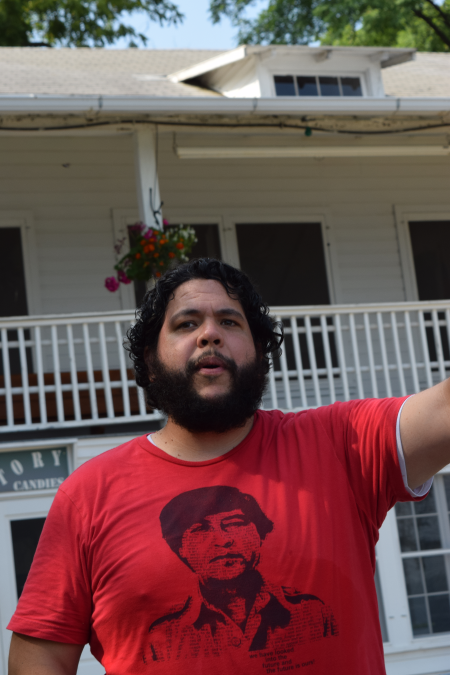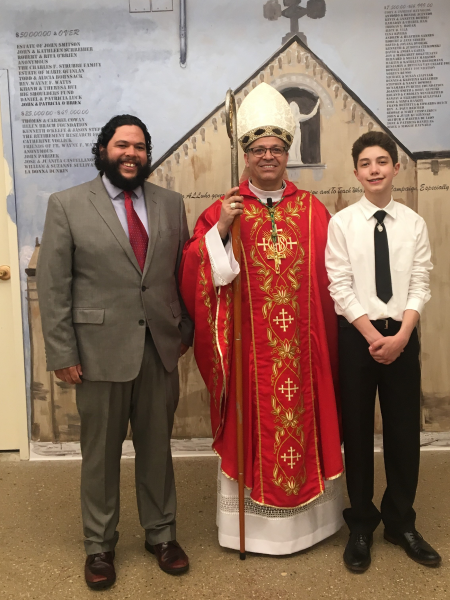Like Chicago itself, Mercy Home for Boys & Girls’ Irish roots run deep.
Chicago prepares to celebrate St. Patrick's day and Mercy Home's tradition for over two decades: March for Kids.
February 26, 2025
Marc Velasquez
August 27, 2019
Manager of Spiritual Development Marc Velasquez has built his career on saying yes.
This practice comes into play a lot at Mercy Home, and Marc feels it was even a big part of why he was hired. But his dedication to saying yes started long before he arrived here.
Marc grew up in Colorado and took a life-changing trip in high school when he attended World Youth Day in the Philippines.
“It was the first time that the world kind of opened up as a bigger place for me and the idea that I didn’t have to live in my hometown, I could do something else,” he said.
That trip inspired Marc to have a college experience that was “far and uncomfortable.” He decided on Boston College, where he majored in English and writing. During his time there, he learned more about Jesuit spirituality and connected with it. And when he spent a week on an immersion trip to El Salvador, he knew that he wanted to pursue spending more time abroad—but something more than just traveling.
“I want[ed] to be in relation with people in different countries, I want[ed] to spend a significant time [there] … so on that trip, I [decided] I was going to apply to the Jesuit Volunteers.”
The Jesuit Volunteers Corps ask its volunteers to spend two years in community service in poor communities.
“It’s a really intense program,” Marc explained. “There is sort of this aura about people who do it. It’s a serious commitment, it’s harder to get into, the people who applied and got it and did it, we kind of viewed them as the cream of the crop, so I never thought I could.”
Unfortunately, when Marc returned from El Salvador, he realized he missed the application deadline by a week. Undeterred, he joined AmeriCorps and spent a year traveling with a team in a van and doing service projects across southern states. He did everything from disaster relief to Habitat for Humanity to building a boardwalk in a nature preserve.
During his time with AmeriCorps, Marc applied to be in the Jesuit Volunteers and was asked to spend two years working in a prison in Belize. After 10 minutes of thinking it over, he accepted.
In Belize, Marc worked with the juvenile population in the prison—anywhere from 30 to 100 kids at a time. Because the youth in the prison were known for sleeping all day and fighting all night, Marc helped establish a schedule for them. They woke up, did a drill routine, took classes in the morning taught by Marc or adult inmates, did trade work in the afternoon, and played sports together in the early evening.

But more important than establishing a schedule was establishing relationships with the youth there, Marc explained.
“The big part was … just really spending time one-on-one or in a small group with the guys hearing about their stories and where they come from and getting to know them and building relationships with them,” he said.
After returning from Belize, Marc worked for a college for a year and continued telling his stories from his time in Belize. And although he realized working in a college wasn’t for him, he did know that he wanted to keep telling stories from his experience at the prison.

“Being in Belize was the hardest experience of my life, but I am so nostalgic for the value that I had,” he said.
When Marc was encouraged to write a book about his time there, he decided to attend graduate school to do just that. Marc spent three years in an MFA program, where he put together around 750 pages of a memoir. He didn’t finish it because he always felt like something was missing—and found that missing piece at Mercy Home. After learning how trauma affects young people’s development, Marc has been doing more research and is looking forward to incorporating that into his book when he completes it.
After graduation, the economy was in a recession and Marc’s plans to work for a publishing house disappeared. Instead, he got a job at a church in downtown Boston where he worked with the homeless population. He sat at a desk near the front door of the church and spoke with people who came in for help.
“I listened to them, walked them through whatever problem it was, I tried to connect them with resources,” he said.
About six years ago, Marc and his now-wife decided to move to Chicago to be near his wife’s family. He was encouraged during this time to apply for the spiritual development position at Mercy Home by his sister-in-law, who at the time worked at the Walsh Campus. Even though he wasn’t sure he was qualified for the position, he decided to send in his resume anyway.

As he and his wife were driving to Chicago for their wedding, Marc got a call and was asked if he could interview the same week he was getting married. Without hesitation, he agreed and the rest, as they say, is history.
“I think ultimately the theme and me coming here … is that you have to be available to say yes and you have to be open to the possibilities of what other people are asking of you,” he said. “That’s a big part of it and I think that goes along with being here, being open to what our youth need and trying to meet them spiritually in that capacity.”
As the manager of spiritual development, Marc says Mercy Home’s main approach to spirituality is inclusivity.
“I get to come to work every day and encounter God or encounter the spirituality of the kids here, and that has to be the way that I approach it,” he said. “I can’t bring my own ideas of it, my own interpretation of it, because that’s not fair to them and that’s not in line with our treatment model either.”
Marc explained that he tells the kids that spirituality is about connection—whatever connects you to other people, connects you to the world, and makes you want to be a better person. And while many people find that in religion and prayer, others may also find it in nature.
A big part of Marc’s job is putting together spiritual retreats for the kids that take place at various times throughout the year.
“That’s where I get to be creative and try out different things and I’ve got to do a lot of really cool things with that,” he said.
Marc added that one place where his spirituality does influence his work at Mercy Home is in the realm of justice.
“My spirituality has always been driven by justice, so I think I see the importance of our youth wanting to make a just impact on the world,” he said. “I think that’s an important part of what we do, too, [like asking the kids], ‘what are you receiving here and how do you repay that?’”
But ultimately, the reason Marc continues love coming to Mercy Home every day is the coworkers.
“I think the encouragement of coworkers who see the value in what I’ve providing and who work with it are amazing,” he said.
“Because there are so many people around here that believe in it, they help—it’s become this bigger thing that people check into, people are doing the work with me and I couldn’t sustain what I do without that,” he said. “So, knowing that those people are here, and they believe in it and not just that they are willing to work with me, but they’re excited about that, that keeps me coming to work every day.”
Chicago prepares to celebrate St. Patrick's day and Mercy Home's tradition for over two decades: March for Kids.
February 26, 2025
If you feel a calling to work with children in need, then a job at Mercy Home for Boys &...
August 28, 2023
At the heart of Francisco Adame’s passion for his job as a youth care worker at Mercy Home is the...
May 25, 2023
Comments